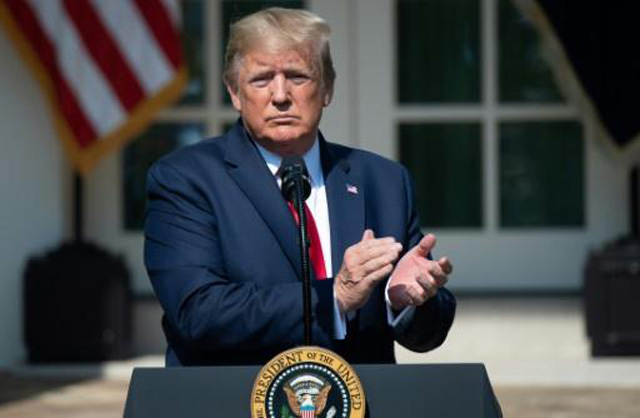
Washington, United States | AFP | When Barack Obama was elected as America’s first black president in 2008, many believed it was a watershed moment for a country bearing the scars of slavery.
Just over a decade later, as the 2020 presidential campaign heats up, the divisive issue of race is occupying center stage, showing how far the United States has come — and how far it still has to go.
“The fact that we are as racially polarized as we are now shows that electing a black person president is not a panacea to solving America’s racial problems,” said Andra Gillespie, an associate professor of political science at Emory University.
“These are systemic and long-lasting issues that have been around as long as the country,” Gillespie told AFP.
President Donald Trump has shown no qualms about exploiting racial tensions for political gain and has made white identity politics a centerpiece of his 2020 reelection strategy.
Jake Neiheisel, an associate professor of political science at the University of Buffalo, said that despite Obama’s election, many people were “pretty skeptical of the idea of a post-racial society.
“I don’t think they would have predicted the rise of a Donald Trump,” Neiheisel said, “but it’s not terribly surprising historically.
“You move in one direction you’re going to have a counter-movement.”
The 1861-65 Civil War which led to the emancipation of African-American slaves was followed by a period known as Reconstruction — the reintegration of the southern states into the union — and of blacks into American society.
Any gains for African-Americans under Reconstruction were short-lived, however, and were largely reversed during the Jim Crow era of racial segregation which lasted until the Civil Rights Act and Voting Rights Act of the 1960s.
Since then, American politicians have generally trod carefully when it comes to issues of race.
Not so for Trump.
“The civil rights movement created some norms against saying things that were blatantly racist,” said Celeste Montoya, an associate professor of women and gender studies at the University of Colorado.
“Donald Trump has kind of broken those norms.”
– Racial resentment –
Trump rose to political prominence as a “birther” — questioning Obama’s origins — and he launched his 2016 campaign with a vitriolic attack on immigrants.
Since then, he has been embroiled in one racial controversy after another.
In 2017, Trump reacted to clashes between neo-Nazis and counter-protestors in Charlottesville, Virginia, by saying there were “very fine people” on both sides.
This month, he said four Democratic lawmakers of color should “go back” to where they came from. Most recently, Trump disparaged the African-American congressman whose district encompasses Baltimore, a majority black city which the president called a “dangerous & filthy place.”
Vincent Southerland, executive director of the Center on Race, Inequality, and the Law at New York University, said Trump is “a symptom of this larger disease of racial inequity that we are constantly grappling with.”
“In order to turn away and move it to the past, we have to first confront it and I think that’s something that we have not quite yet done,” Southerland said.
Trump’s “Make America Great Again” campaign slogan “harkens back to a period of time when America was not actually great for a whole host of reasons for a lot of people,” he said.
Montoya said Trump has successfully used racial resentment to mobilize voters.
“Immigrants and racial minorities become the scapegoats for why people are suffering,” she said.
To some extent this is politics as usual, according to Neiheisel.
“Arguably, politics has always been about group conflict,” he said. “If you can pit people against each other that’s an easy way to mobilize.”
– Reparations –
Race has also featured prominently in the Democratic primary contest as the candidates seek to reforge the multi-racial coalition of voters who propelled Obama to victory.
Racial inequality and the “Black Lives Matter” movement have been a subject of debate among the Democrats and the candidates have also been discussing whether reparations should be paid to descendants of slaves.
Senator Kamala Harris, one of two African-American candidates in the Democratic race, surged in the polls after attacking former vice president Joe Biden over his record on racial issues while serving in the US Senate.
“Part of that is a response to Trump and the rhetoric that he has raised and his efforts to make race a central issue of the campaign from a negative standpoint,” Southerland said.
But it’s also because Democrats need black votes if they hope to recapture the White House.
“In order to excite and turn out communities of color, you need to signal to them that you’re paying attention to the inequalities and experiences that they have,” Gillespie said.
The relatively poor turnout of African-Americans for Democratic candidate Hillary Clinton in 2016 is frequently cited as one of the main reasons for her upset loss to Trump.
While blacks voted overwhelmingly for Clinton they did not cast ballots in the overall numbers seen during Obama’s two successful bids for the White House.
“If Democrats can’t turn out voters of color, they’re not going to win this election,” Gillespie said.
 The Independent Uganda: You get the Truth we Pay the Price
The Independent Uganda: You get the Truth we Pay the Price


